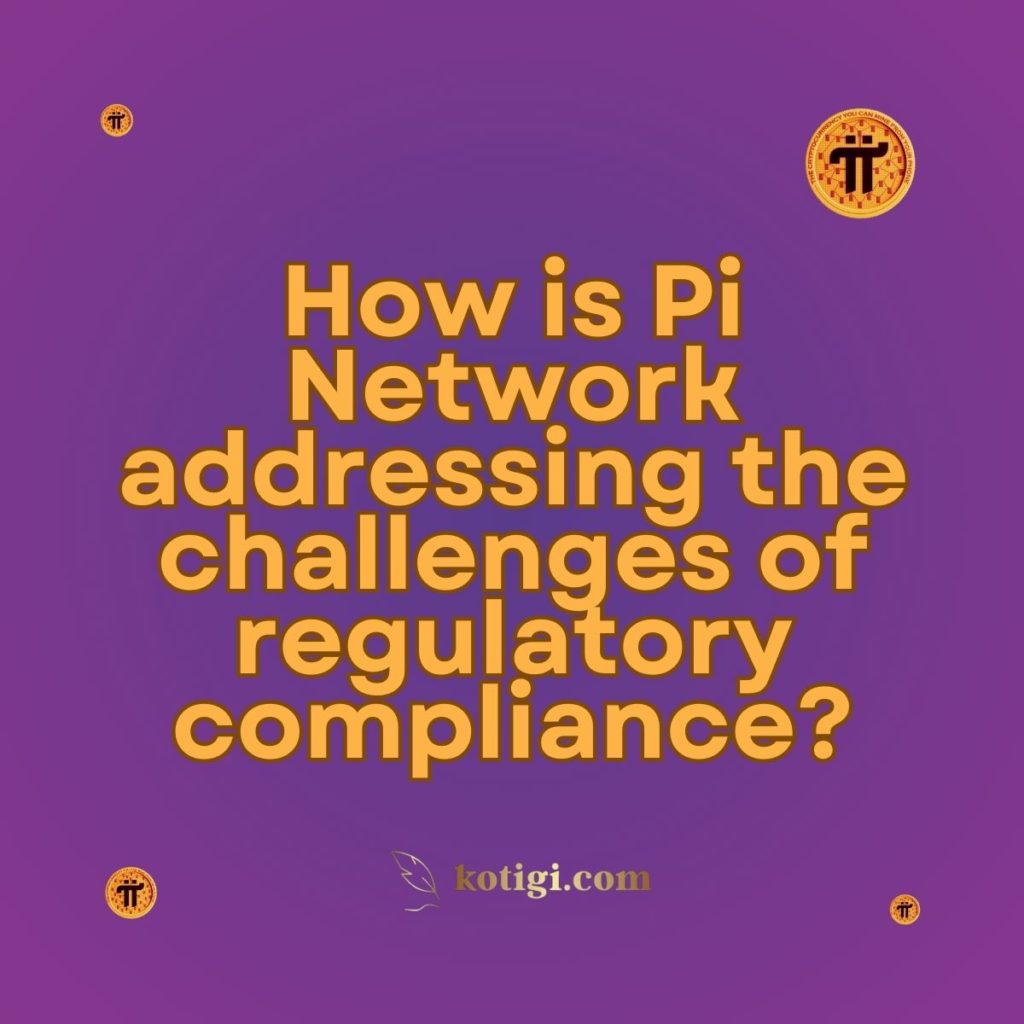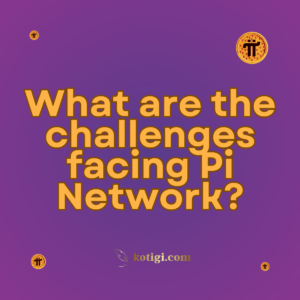
What is Pi Network?
Pi Network is actively addressing regulatory compliance challenges by fostering transparent operations, engaging with regulators, and prioritizing user security, positioning itself as a responsible player in the evolving cryptocurrency landscape.
Introduction
As the cryptocurrency market matures, regulatory compliance has become a focal point for projects aiming to establish legitimacy and foster user trust. Pi Network, designed to make cryptocurrency accessible to a broader audience, understands that adherence to legal and regulatory frameworks is essential for its success. This article delves into how Pi Network is addressing the multifaceted challenges of regulatory compliance, highlighting the strategies it employs to ensure sustainability and user confidence in its operations.
Understanding Regulatory Compliance in Cryptocurrency
Regulatory compliance entails adhering to laws governing financial transactions and digital assets, which can vary significantly by jurisdiction. In the cryptocurrency sector, compliance challenges often manifest through complex requirements, including anti-money laundering (AML) laws, know your customer (KYC) protocols, and taxation regulations.
Importance of Compliance
Regulatory compliance is essential for preventing illicit activities, building user trust, and promoting the overall legitimacy of the cryptocurrency industry. Projects that neglect compliance risk facing legal repercussions and reputational damage, which can hinder their growth.
Challenges Faced by Cryptocurrencies
The industry faces significant hurdles, including ambiguous regulations that differ across countries, frequent changes in the regulatory landscape, and jurisdictional variations that complicate compliance efforts. These factors create uncertainty, making it challenging for projects to implement consistent compliance strategies.
Impact on User Adoption
Failure to comply with regulations can hinder user adoption, as potential users may be wary of engaging with platforms that lack legitimacy. A trustworthy regulatory framework is vital for attracting users and investors, fostering a healthy ecosystem for cryptocurrency.
Pi Network’s Commitment to Transparency
Transparency is a cornerstone of regulatory compliance, and Pi Network emphasizes the importance of clear communication with its user base regarding its operational practices and governance structures. The project actively engages in open communication by providing regular updates on platform developments and compliance initiatives.
Open Communication Channels
Pi Network ensures that users are informed about how the platform operates and the measures it implements to adhere to regulatory standards. Regular newsletters and announcements keep the community updated on relevant changes.
Public Documentation
The project makes its white paper and relevant documentation publicly available, detailing its goals and compliance strategies. This accessibility helps users understand the foundation of Pi Network’s operations and its commitment to compliance.
Community Feedback Mechanisms
Engaging users through various feedback mechanisms, such as surveys and Q&A sessions, fosters a sense of community and allows users to voice their concerns or suggestions regarding compliance measures. This dialogue enhances trust and encourages user participation in governance.
Engaging with Regulatory Authorities
Proactive engagement with regulatory bodies is essential for successfully navigating the complex landscape of cryptocurrency regulation. Pi Network is dedicated to building strong relationships with regulatory agencies, which enables it to better understand their expectations and requirements.
Building Strategic Relationships
Establishing connections with regulatory agencies allows Pi Network to position itself as a cooperative partner in regulatory discussions. This collaboration can lead to more favorable regulatory outcomes for the cryptocurrency sector.
Participating in Industry Forums
Active participation in industry forums and discussions keeps the project informed about the latest regulatory trends and promotes open dialogue with regulators. Such engagement helps Pi Network stay ahead of potential regulatory changes.
Advocacy for Favorable Regulations
Through these engagements, Pi Network advocates for regulations that support innovation while ensuring compliance. By communicating the benefits of cryptocurrencies, the project aims to contribute to a more balanced regulatory environment.
Implementing KYC and AML Measures
Implementing Know Your Customer (KYC) and Anti-Money Laundering (AML) practices is vital for regulatory compliance, and Pi Network is taking significant strides to enhance its legitimacy in these areas.
User Verification Processes
The platform plans to introduce streamlined, user-friendly verification processes for KYC compliance, ensuring that users can easily complete the necessary steps without feeling overwhelmed. Simplifying this process encourages user participation.
Automated Monitoring Systems
Pi Network aims to implement automated transaction monitoring systems to detect suspicious activities and ensure adherence to AML regulations. These systems play a critical role in identifying potential fraud and mitigating risks.
User Education on Compliance
Educating users about KYC and AML requirements is a priority. Pi Network provides resources and guides to help users understand their responsibilities, fostering a culture of compliance within the community.
Prioritizing User Security and Data Protection
User security is paramount for Pi Network as it seeks to build trust and reliability within its community. The project is committed to implementing robust data privacy measures that comply with global regulations.
Robust Data Privacy Measures
This includes employing data encryption techniques and secure storage practices to safeguard user information against breaches. Pi Network recognizes that user trust hinges on the security of their data.
Educating Users on Security
Providing resources on security best practices helps users protect their accounts from potential fraud and scams. By empowering users with knowledge, Pi Network enhances overall network security.
Incident Response Preparedness
Establishing incident response plans ensures the team is ready to address any data breaches swiftly and effectively. This preparedness minimizes potential damage and demonstrates a commitment to user safety.
Adapting to Evolving Regulations
The regulatory landscape for cryptocurrencies is continuously evolving, and Pi Network recognizes the importance of adaptability in this dynamic environment.
Continuous Monitoring of Regulatory Changes
The project actively tracks regulatory developments across jurisdictions to ensure its practices remain current and compliant. This proactive monitoring is vital for timely responses to new regulations.
Scenario Planning for Compliance
Engaging in scenario planning allows Pi Network to anticipate potential regulatory challenges and develop effective strategies to navigate them. This foresight helps mitigate risks associated with compliance.
Collaboration with Regulatory Technology
By leveraging regulatory technology (RegTech) solutions, Pi Network streamlines compliance processes and enhances its ability to adapt to changing regulations efficiently. This technological integration supports a proactive compliance strategy.
Conclusion
Pi Network is taking a comprehensive approach to address the challenges of regulatory compliance. By emphasizing transparency, engaging with regulatory authorities, implementing KYC and AML measures, prioritizing user security, and adapting to evolving regulations, Pi Network positions itself as a responsible player in the cryptocurrency space. This commitment to compliance not only enhances user trust but also lays a solid foundation for the project’s long-term sustainability. As the cryptocurrency landscape continues to evolve, Pi Network’s proactive strategies will help it navigate the complexities of regulatory compliance effectively, fostering a secure and legitimate platform for its growing user base.
Key Takeaways
- Regulatory compliance is essential for preventing illicit activities and building user trust.
- Transparency is a priority for Pi Network, emphasizing open communication and public documentation.
- The project actively engages with regulatory authorities and industry peers to enhance compliance efforts.
- KYC and AML measures are being implemented to ensure legitimacy and foster a culture of compliance.
- User security and data protection are paramount, with a commitment to robust practices and user education.
- Pi Network continuously adapts to regulatory changes, utilizing technology to streamline compliance processes.



